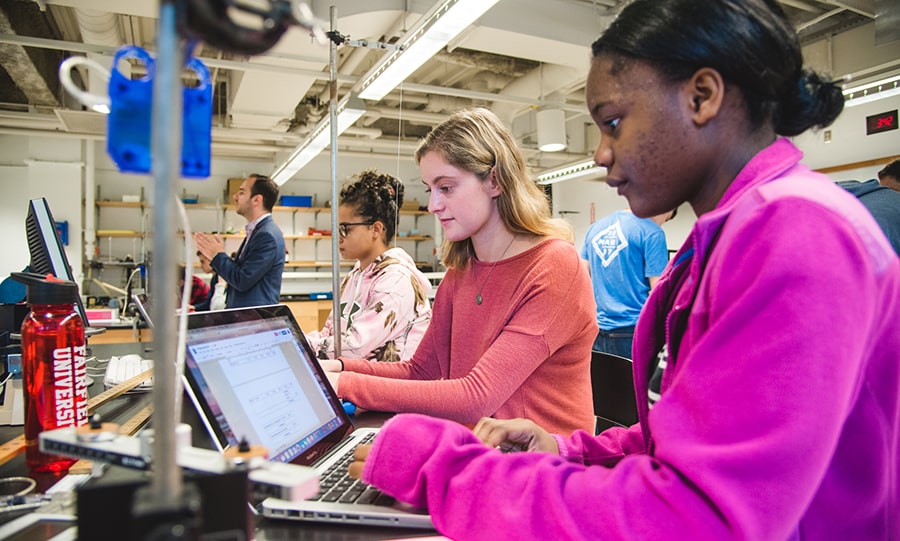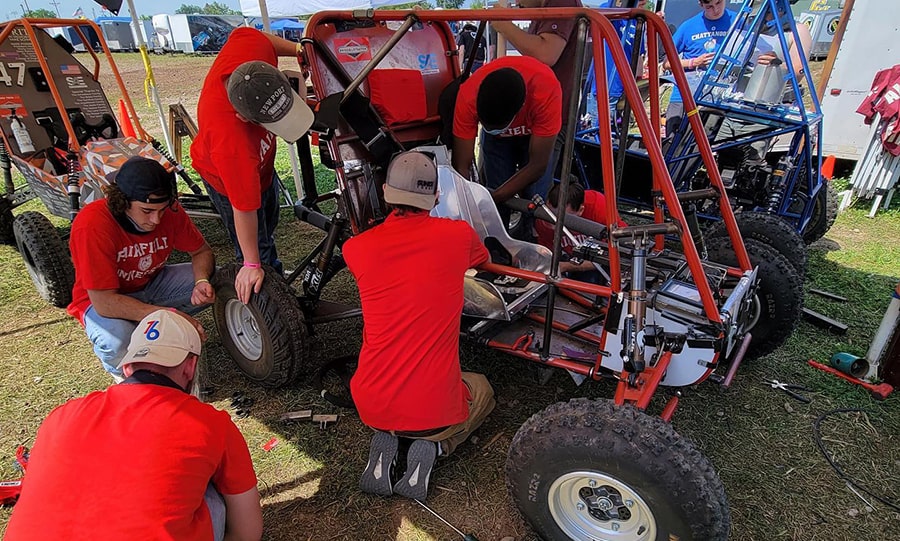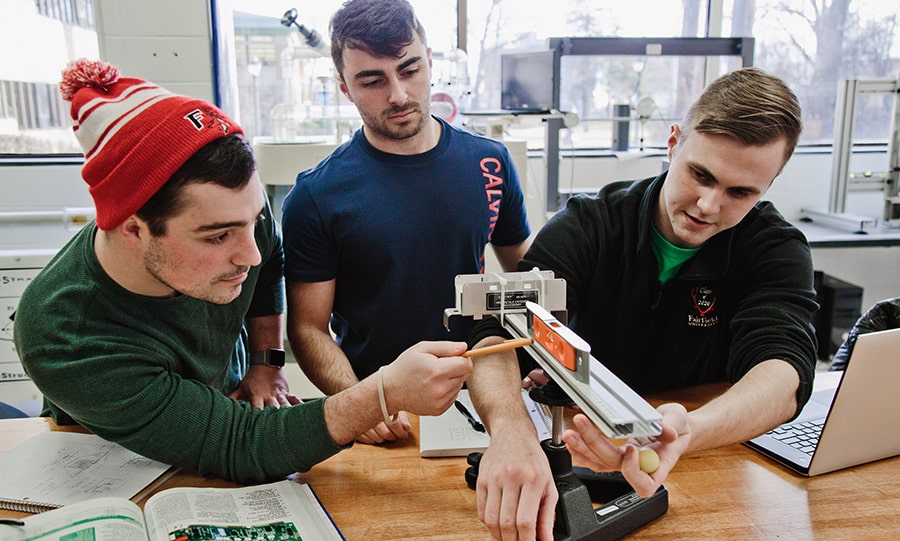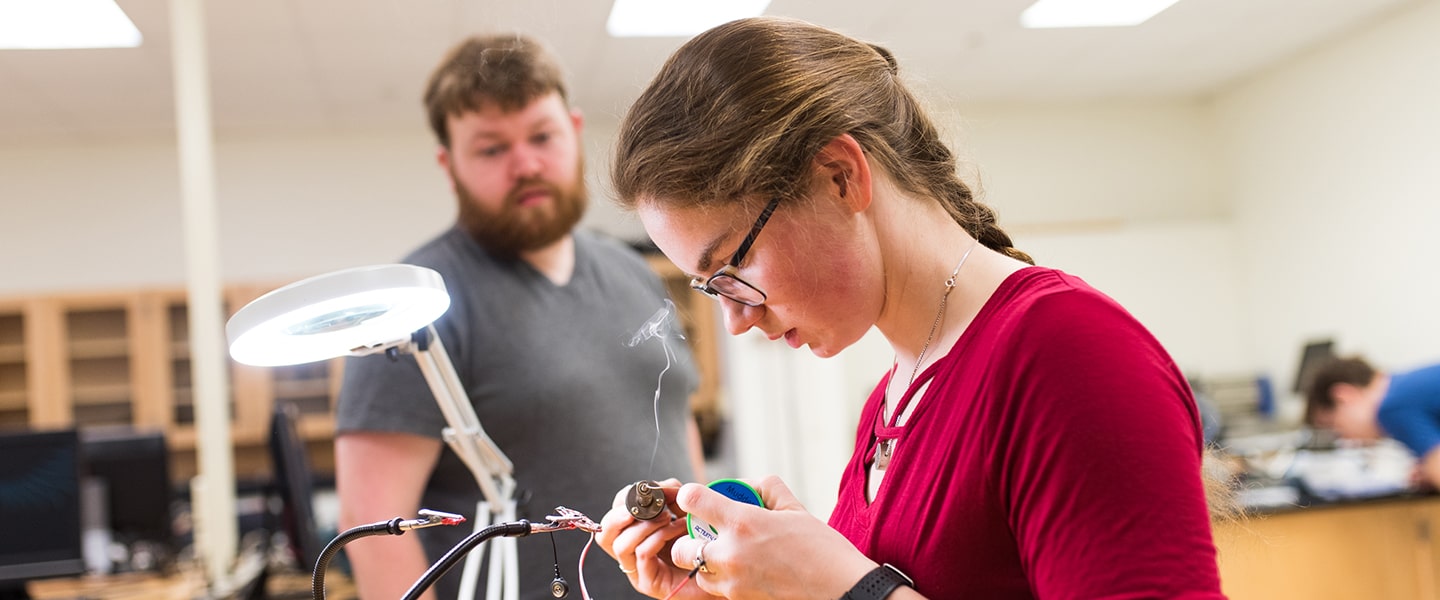On This Page
See Yourself at the School of Engineering & Computing
The School of Engineering & Computing has many opportunities for students to engage themselves in active learning. We offer vibrant events and professional development series that allow our students to grow outside the classroom.
Professional Development Series

The School of Engineering & Computing's Professional Development Series (PDS) consists of a series of events, seminars and workshops tailored to fit the needs of our students and designed to supplement their academic development. PDS provides a structured forum for students to gain the necessary knowledge, skills, and networking strategies to leverage their education into a productive career.
Clubs & Organizations

- Innovators Club
- Engineering Student Society
- Tau Beta Phi Honor Society
- Society of Women Engineers
- National Society of Black Engineers
- Society of Automotive Engineers
- Association of Computer Machinery
- Biomedical Engineering Society
- Engineers Without Borders
- Institute of Electrical & Electronic Engineers
- American Society of Mechanical Engineers
Internships

The School of Engineering & Computing views hands-on experience as an important part of a student’s academic journey at Fairfield. Internships gives students the opportunity to make connections and gain real-world experience while giving students a competitive edge in the job market. Engineering students pursue internships across a variety of industries from government, to private sector, to non-profit:
- NASA
- GE
- HOLOGIC
- Lockheed Martin
- Nasdaq
- UI
- RBS
- Stanley Black & Decker
- UTC Aerospace Systems
- Medtronic
- Sikorsky
Computer Requirements for First-Year Students
The School of Engineering and Computing (SEC) has a policy that all students will provide their own personal laptop computer. This computer must be able to install and run software used during the 4-year SEC curriculum.
Engineering Majors
Windows 11 is required and is needed for engineering software. Microsoft® Windows 11 Home (64 bit) is recommended. The majority of engineering software used in engineering courses is Microsoft Windows based and may not run on the Mac operating system. We do not recommend a Mac computer for engineering usage.
Computer Science Majors
The students in the CS programs may use either a Mac or a PC laptop.
Microsoft Windows Recommendations
- CPU: faster Intel Core i7 (64-bit) or AMD Ryzen 7
- RAM (memory): 16GB minimum, preferably 32GB for SolidWorks
- Storage: SSD 512GB or 1TB.
The Intel Core i9 or AMD Ryzen 9 series are high performance processors that may be helpful to run SolidWorks but are not mandatory. Faster is generally better. A better graphics card such as the NVIDIA GeForce RTX 4080, Nvidia Quadro RTX, NVIDIA RTX A1000 GPU (4GB VRAM), or an AMD Radeon Pro, will have an advantage in 3D CAD.
Apple MacOS Recommendations
Apple has two laptop lines: the MacBook Air and the MacBook Pro. The MacBook Air comes in 13″ and 15″ models, and the MacBook Pro is available in 14″, and 16″. The M2 MacBook Air should be sufficient for Computer Science student needs. However, Apple released a more powerful M3-powered version in 2024 that costs a small amount more than the M2.
You may want to consider upgrading a MacBook Air to include 16 GB of unified memory. Alternatively, consider obtaining a MacBook Pro with the M3 Pro chip, which offers 18 GB of unified memory and better performance than a model with the non-Pro chip.
Wireless capability, Bluetooth, HDMI port, USB ports, Audio jack, External hard drive (1TB+ for back-up purposes).
Microsoft Office 365 will be provided free to all students.
The School of Engineering and Computing will provide certain software for student use during the appropriate course. These may include Matlab, SolidWorks, and Multisim, as well as Software Development Environments. In certain courses, an instructor may require you to purchase a particular software or license key for their course as required course materials (like your textbooks).
The University supports and provides some discount options to students for HP or Dell and Mac laptops. See www.fairfield.edu/buyacomputer for more information. The School of Engineering and Computing does not require a specific brand, but reliability and ease of service are things you should consider before purchasing. Whether you purchase a PC or a Mac, you should also consider an accidental protection plan to cover the 4 years at Fairfield.
Examples of typical PC laptop computers that will run CPU and memory intensive software (such as SolidWorks) are the following:
Acer Nitro 5
ASUS Rog Strix G16
ASUS ProArt StudioBook
ASUS ZenBook Pro 15
Dell XPS 15
Dell Precision 7000
Lenovo ThinkPad E15
Lenovo ThinkPad P1
Lenovo ThinkPad P16
Lenovo ThinkPad P17
Lenovo Legion Pro 7i
HP ZBook Power G9
HP ZBook Studio
Note that computer manufacturers regularly change model names, numbers and specifications. The University does not endorse any of these vendors or their computers other than to provide option examples to our students.
If students need support, they should contact the ITS Help Desk in the Library or at (203) 254-4069 for assistance.
Resources
Life After Fairfield
The School of Engineering & Computing aims to graduate students with leading-edge engineering skills and additional competencies in oral and written communications and critical thinking who possess:
- A well-developed cultural orientation
- An understanding of economic values
- A sense of ethical and social responsibility
Fairfield's engineering programs graduate liberally educated engineers equipped with knowledge and experiential skills so they may successfully enter the mainstream of industrial/manufacturing activity, education, or government service, or to continue with postgraduate studies. Our close interactions with industry enable employment of our graduates in all sectors of industry, government, and academe.
Learn more about how Fairfield's Career Center can support your post-graduate goals, and how Fairfield's tight-knit alumni network can build career and mentoring opportunities that last a lifetime.
